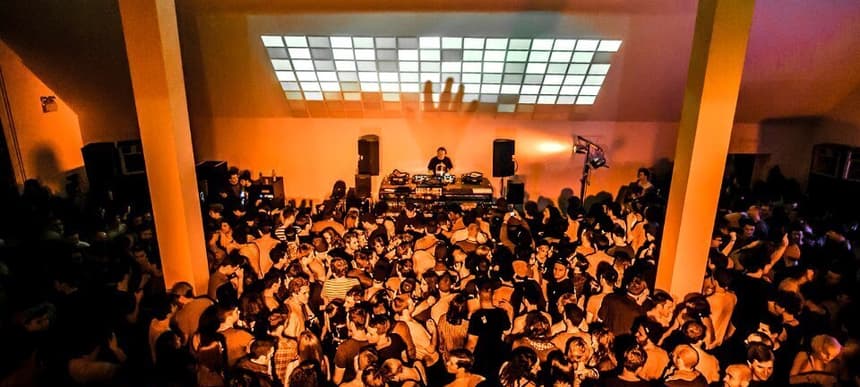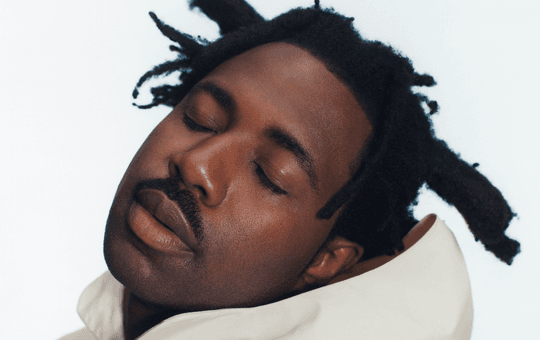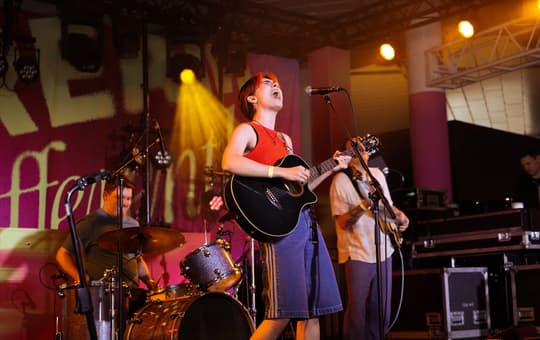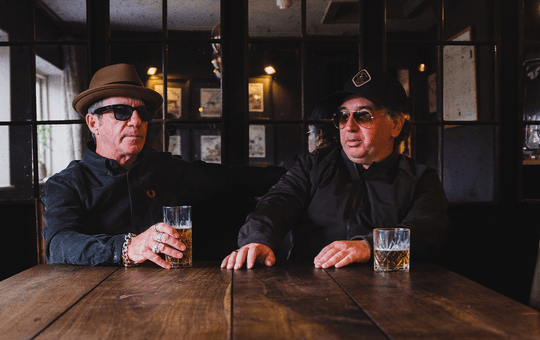
Profile: The promoters helping re-build London's Broken & Uneven nightlife
Broken & Uneven is a London-based promotion company formed in 2012 by Ajay Jayaram and Dolan Bergin and built on their shared experiences of organising electronic music events for close to two decades, including successful stints programming in-house at the The End and Cable. Taking the expertise of years in the business, they've struck out on their own, and Broken & Uneven – run under the banner "Parties for a nightclub that doesn't exist" – is dedicated to showcasing as much of the music they love as they can, no matter how old, new, big or small.
The jewel in their crown is The Hydra, a specially curated, multi-venue series of events that runs through autumn and winter and is now entering its second year. Phase 1 of the current series runs from the August Bank Holiday Weekend to New Years Day 2014 and will feature artists and labels like Underground Resistance, Francois K, Border Community and Hyperdub (to name just a few) playing across a range of studio spaces and established club venues like Fire, XOYO and Village Underground. Given the current bleak state of London nightlife, with the recent closure of Cable; Ministry of Sound and the Macbeth under threat from new housing developments and Hackney Council's proposal to introduce a Special Policy Area in Dalston – effectively banning the opening of any new nightclub along a mile long strip from Kingsland Road up to Stoke Newington Road – the multi-faceted Hydra can seem an ideal solution. If it is, it's accidental. The original idea was actually to base the series around one custom central location, but they've been forced to share their schedules across multiple venues after complications arose in both years. Faced with the authorities' increasing reluctance to grant both permanent and temporary licenses, they have reached a compromise that allows them the independence to cater events to their own standard whilst making the most of the capital's available venues.
It's not perfect but its very neccessary, and Broken & Uneven's passion to properly represent a local music scene has surmounted the obstacles that have stood in their way. With less than a week before the new series kicks off Dummy spoke to co-founder Jayaram about how the idea of The Hydra developed, the surprises yet to be announced and why he is already thinking about next year's instalment.
What are the origins of Broken & Uneven?
Ajay: Well, I was head of programming at The End for about ten years, until it closed. After that, me and one of my colleagues at The End, Ryan Ashmore, set up an independent promotions company called We Fear Silence. When the End shut down it was our job to inform all the nights that we were closing and one of the things that came out of all of these conversations, in a really nice way, was a lot of people asked if we were continuing promoting and would work with them. So it came about as a result of those conversations really.
"This year in particular, we've noticed a – not that it's been spelt out like this – a clampdown on the way temporary licenses are being handled in certain boroughs in London. You can probably notice that there are less TBA-type events going on because it's increasingly difficult to secure a temporary license in London at the moment."
We started at a few different venues around London: what was the Arches, Corsica Studios, and a couple of other spaces – then we were approached by Cable, who asked if we would do some events there. So, Ryan and I become directors at Cable and become the in-house Saturday night event there – working from Cable as a base.Then I left in October 2011, just 'cause I felt the need to be independent again really. Broken & Uneven as the next logical step in terms of promotions. In a similar way to what happened at The End I had a lot of relationships with people who I wanted to work with but didn't get the chance to at Cable for one reason or another. So there were a lot of labels, collectives and bands that ended up forming what became the Hydra.
Do you prefer a more independent approach to promotion, as opposed to a weekly expectation at a club?
Ajay: Yeah. Also, with my background at The End – I cut my teeth doing that. I was used to putting together a program of regular Friday and Saturday night events, so doing the same thing at Cable also came naturally to me having done it such a long time. I suppose doing things the way we do them now across multiple venues does lend itself to a versatility in terms of doing small label-focussed things or putting on acts we like without having to worry too much about filling up a large space because ours is a certain size. We can cut our cloth according to the things we're doing. It's great to be able to do something like Underground Resistance and Robert Hood but equally we can do a Modern Love showcase at Autumn Street Studios which can only hold about 500 people. It's nice to be able to cater for all the different things we like.

I guess it's a different kind of responsibility, because now everything is done event-by-event. You have to manage each one according to its own context.
Ajay: I guess one of the challenges of using lots of different venues, sadly, is there are varying degrees of quality. There are lots of great, amazing venues but I guess we set our stall a bit with our warehouse parties – which are bespoke events where we can take our whole sound team, bar team and have direct control over every aspect. In terms of our ethos of everything being to a certain standard we want everything to be the same. I think we're lucky in as much as all the venues we're working with are either of a great standard anyway or, in cases where the sound system isn't exactly the way we want it – also, don't forget that sound quality is a very particular, subjective thing – they're very open to the idea of us going in and playing around with things. We're lucky we established ourselves last year and, since we've been doing this for a while anyway, they've given us the dispensation to play around with things and we feel comfortable that we can put an imprint on every event.
How did the idea of a multi-venue series like The Hydra come about?
Ajay: That's actually a really interesting question because the concept of a multi-faceted series of music events was born out of the fact that we love a wide range of music and we've working with really cool, interesting, great people across genres and tribes and camps. So, I guess that happened very organically – the core of the concept – but what's interesting is the original concept in terms of the venues themselves was supposed to be based in one venue – Hackney Down Studios. That's where we did the first Broken & Uneven event – an Ostgut Ton night in 2012. It's an absolutely incredible, really versatile space where we could do all the different events in one space. The original concept was to have it all there, but for various reasons it wasn't possible to do it all – and we found out about month before the start so there was a bit of a scrabble around to re-house everything into existing and generally licensed venues. So that's kind of how it came about with the first series.
For this year, the plan again [laughs] was to do everything in one venue we've been using a lot – a place in Wapping called Studio Spaces, a photographic studio owned by a very good friend of ours – and we applied for a Time Limited Premises License but it was rejected unfortunately, due to over-zealous residents I guess. The studio used to be a nightclub and they had a lot of heat and hassle and some residents were concerned about what they felt was a return to that kind of scenario – though obviously that's far from how we operate. So it fell through and we found ourselves in a similar situation of re-housing things. It wasn't all going to be at the one place – we had other plans for certain things – but the majority of it was. So, for the second year it naturally evolved into a multi-venue series – it almost seems like someone telling us that's the way it should be [laughs]. I think for next year we'll probably abandon the idea of doing it in one place and work with the venues we do now from the off.
"When The End closed, when Turnmills closed and the venues in the Kings Cross area closed down – I don't feel the needs of the people who went to those venues were adequately responded to in London as a whole. I find it strange that there's probably only six or seven clubs from London in the top 100 worldwide."
I always thought it was part of the plan.
Ajay: I wish we could say it was and say we are far more savvy than we really [laughs] but the truth is it was an accident. The only thing is, this year in particular, we've noticed a – not that it's been spelt out like this – a clampdown on the way temporary licenses are being handled in certain boroughs in London. You can probably notice that there are less TBA-type events going on because it's increasingly difficult to secure a temporary license in London at the moment. That was our bread-and-butter for a time so that's influenced our move into licensed venues as well.
But it hasn't been a great time for the licensed venues recently either, has it? With the recent closures and the latest Dalston SPA proposal.
Ajay: Yeah, I was reading about that earlier today as well. At the risk of sounding all doom or gloom, there's an element of what we're involved with being on its arse at the moment, to be honest. There is this difficulty in securing anything on a temporary basis which makes it difficult for promoters to do what they do and, obviously, when certain areas are under the scrutiny of the authorities in this way the potential for things to come to a standstill exists.
A positive thing is it is just a proposal as well, and I think they tried a similar one a few years back and it didn't get the backing.
Ajay: Well, that's heartening – definitely. I just kind of feel that when The End closed, when Turnmills closed and the venues in the Kings Cross area closed down – I don't feel the needs of the people who went to those venues were adequately responded to in London as a whole. I find it strange and it's shame that when the club polls come out – not that they are to be taken as gospel but they are an indication of what's out there – there's probably only about six or seven clubs from London in top 100 worldwide. That's not great really, is it? That doesn't consider the burgeoning underground scene in venues that aren't licensed or on the radar but I think our city should have a decent sprinkling of both: the small, almost illicit, house party kind of thing and some key major venues that people all over the world are keen to come to.
"I think some of the stuff we're doing doesn't have a natural home anywhere else in London in terms of a venue. What we're essentially doing is promoting club events, but it's effectively a versatile venue without bricks and mortar."
Well, accident or not, that's kind of what you've done on a micro-scale with the Hydra isn't it?
Ajay: Yeah, I hope so. I think some of the stuff we're doing doesn't have a natural home anywhere else in London – in terms of a venue or whatever. With our background it makes sense – what we're essentially doing is promoting club events but it's effectively a versatile venue but without bricks and mortar – that's what we are. I do also think that now, the way the music and the dynamic of the scene is – producers and artists and musicians, influencing one other in a greater way than has ever happened before – people still have their core nights or labels or whatever but have a keen eye on the other things we do. I like the idea, not that it's not necessarily realistic, that people who attend our events will cast an eye on the rest of series and check out something new and intriguing.
There's a lot of great music out there and the driving force is for us to put on events that are interesting to us – first and foremost – and aim to do it in a way that's successful for us as a business and others as an experience. It's got London to have it's own series, other territories have their own series and spin on things so it's good to keep it fresh here.

Are there any particular highlights for you from the upcoming series?
Ajay: Someone asked me this the other day I came out with the oft-quoted “It's like choosing between my kids” line [laughs]. Definitely the launch party; I'm a big Underground Resistance fan first and that came to us a little bit later with Cable closing. They were the home of Blueprint and if they hadn't closed it might not be taking place. Those guys have put on an incredible line-up and it's a really strong way to start the series. But it's all interesting, even if that sounds like a cop out. The other thing is that there's quite a few really strong headline names to announce that we can't let out for various reasons, so we haven't revealed absolutely everything. I'd say there's probably six or seven key headliners that we'll be announcing in the coming months. So it'll be good to be how the response to those announcement will be. There's still a lot to do but I think we're in a good place.
The Hydra lauches with a Blueprint Detroit Techno special at Electric Brixton featuring Underground Resistance, Jeff Mills, Robert Hood, James Ruskin and Sam Kerridge this Saturday 24th August. Full details and tickets of this and the rest of their other upcoming events are here.













